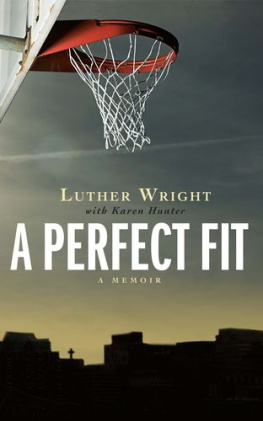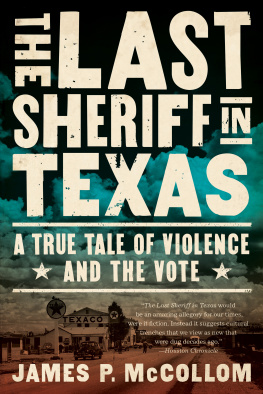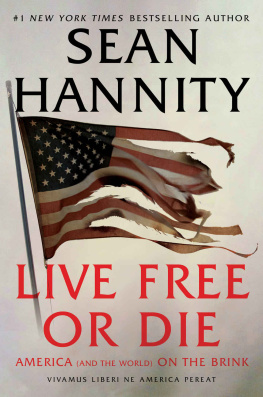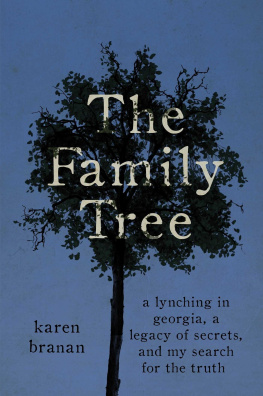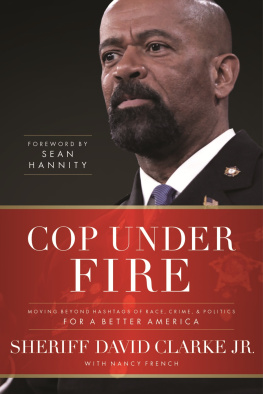


COPYRIGHT 1999 Larry McShane
All rights reserved. No part of this publication may be reproduced or transmitted in any form or by any means electronic or mechanical, including photocopy, recording, or any information storage and retrieval system now known or to be invented, without permission in writing from the publisher, except by a reviewer who wishes to quote brief passages in connection with a review written for inclusion in a magazine, newspaper, website, or broadcast.
Originally published in 1999 as a hardcover
First ebook published in 2015: eISBN 978-1-62157-399-9
Regnery is a registered trademark of Salem Communications Holding Corporation
The Library of Congress has cataloged the hardcover as follows:
McShane, Larry.
Cops under fire : the reign of terror against hero cops / Larry McShane.
p. cm.
Includes index.
1. Police community relationsUnited StatesCase studies.
2. Police shootingsUnited StatesCase studies. 3. Police discretionUnited StatesCase studies. 4. Police and the pressUnited StatesCase studies. 5. PoliceUnited StatesPublic opinionCase studies. 6. Public opinionUnited StatesCase studies. I. Title.
HV7936.P8M37 1998
363.2320973dc21 98-48035
CIP
Published in the United States by
Regnery Publishing
A Salem Communications Company
300 New Jersey Ave NW
Washington, DC 20001
www.Regnery.com
Distributed to the trade by
Perseus Distribution
250 West 57th Street
New York, NY 10107
Manufactured in the United States of America
10 9 8 7 6 5 4 3 2 1
Books are available in quantity for promotional or premium use. For information on discounts and terms, please visit our website: www.Regnery.com.
For my wife Marjorie and our three children Stacey, Megan, and Joseph.
CONTENTS
T HANKS TO AL REGNERY and everyone at Eagle Publishing for their help and confidence in a first-time author; thanks to Ed Hayes, who made it all possible; thanks to Rick Hampson, Jerry Schwartz, Richard Pyle, and Bob Hardt, good friends who always offered better advice; thanks to all the guys in parking lot 17-D, Giants Stadium; and most of all, thanks to the officers whose stories are told in this book, and to the lawyers who defended them, for their patience and cooperation. Thanks to my parents, Jack and Nora McShane, for a lifetime of love and support.
I TS ALWAYS ABOUT second-guessing. Youre riding in a patrol car through a particularly nasty stretch of urban AmericaBed-Stuy in Brooklyn, Watts in Los Angeles, downtown Detroitnear the end of a drowsy midnight-to-eight tour. Or maybe youre in some suburb, a low-crime oasisCedar Grove, New Jersey, or Revere, Massachusettsplaces where cops can go a whole career without ever unholstering their weapon, and youre questioning a burglary suspect on an otherwise quiet afternoon.
And something happens. It could be a big somethingthe pop-pop-pop of a 9mm emptying somewhere nearby, or a suspect making a move toward your weapon. It could be a small somethinga routine radio call, a traffic stop, or a suspicious-looking lowlife (a skell in police parlance) standing in the wrong place at the wrong time. It could be happening somewhere elseas youre driving quietly along, somebody one town over steals a car and makes a wrong turn and winds up on your turf.
It doesnt happen to a lot of cops. In New York City, for example, there are 38,000 police officers assigned to protect a population of more than 7,000,000 people. Only 250 have ever used their weapons in the line of duty three timesless than one-tenth of 1 percent. The odds that it wont happen at all are very, very good.
But when it does happen, it will change your life forever.
It doesnt matter how it happens. If it does happen, it will be over in a matter of minutes, maybe even a matter of seconds. Its repercussions will echo for years and years.
A woman named Strawberry happened to Officer Robert Leaks of the Newark Police Department one summer night in 1997. Strawberry had a long police rap sheet, and a taste for cocaine. It was the latter that drew Leaks, who moved in to make a simple street corner drug arrest. But Strawberry tried to hijack a police car, dragging Leaks along for the most frightening (and nearly the last) ride of his life. Within minutes, Strawberry was deadkilled by a single gunshot fired by Officer Leaks, who was forced to take her life to save his own. It was the first time he had ever shot his service revolver on duty.
Before a grand jury determined it was a case of justifiable homicide, Leakss name was dragged through the mud by everybody from the victims friends and family, to members of a notorious reputed drug gang, to the mayor of Newark. The shooting became a racial/political football, and everyone in the game lined up to kick Leaks. The way his case was handled, it became clear that politics took precedence over job performance, and so his supporters railed.
That scenario is familiar to Officers Larry Nevers and Walter Budzyn of the Detroit police. One minute theyre subduing a possible drug suspect outside a crackhouse in a rugged section of the Motor City in 1992. Hours later, they watch the mayor of Detroit announce on national television that they, along with five other officers who arrested the drug suspect, are murderers.
Guilt or innocence is a question that can be answered by a jury. An officers reputation? Thats harder to determine or protect.
The other five cops were never convicted of anything; most wound up collecting healthy settlements from the city after suing the mayor for his summary judgments. Nevers and Budzyn were not quite so lucky.
These two plainclothes detectives battled with suspect Malice Green on November 5, 1992. Both were convicted, after controversial trials, of second-degree murder. Both recently had their convictions overturned, but Budzyn was subsequently convicted of involuntary manslaughter. Both continue to fight to clear their names despite spiraling legal bills. Support from their families and friends has helped them cope with the dark days and the deepening costs.
Ahh, legal bills. Restoring your reputation does not come cheaply in these days of $500-an-hour lawyers. The cost can climb well into six figures for the simplest defense case; it increases exponentially as the case goes through the lengthy appeals process. Criminal trials are only part of the problem; most of those are accompanied by civil suits filed by arrestees looking for a payday. Since many police officers are routinely underpaid, the money needed to defend yourself can be devastating to the family budget, the mortgage, the food bills.
Just ask Ramiro Pena.
Pena, a twenty-seven-year-old cop in Grand Rapids, Michigan, wound up in court trying to clear his name, too. A routine traffic stop of a car with stolen license plates turned violent when the driver sped off with two cops hanging from the wildly careening car. Pena, rushing to the aid of his fellow officers, helped arrest the driver by following official police procedureand was rewarded with charges of aggravated assault. Before he was even charged, Pena was suspendedwithout payfor seven weeks. The threat of a civil suit also hangs over Pena, another guaranteed bank account buster. Officer Leaks is facing possible civil action, as well.
Next page

